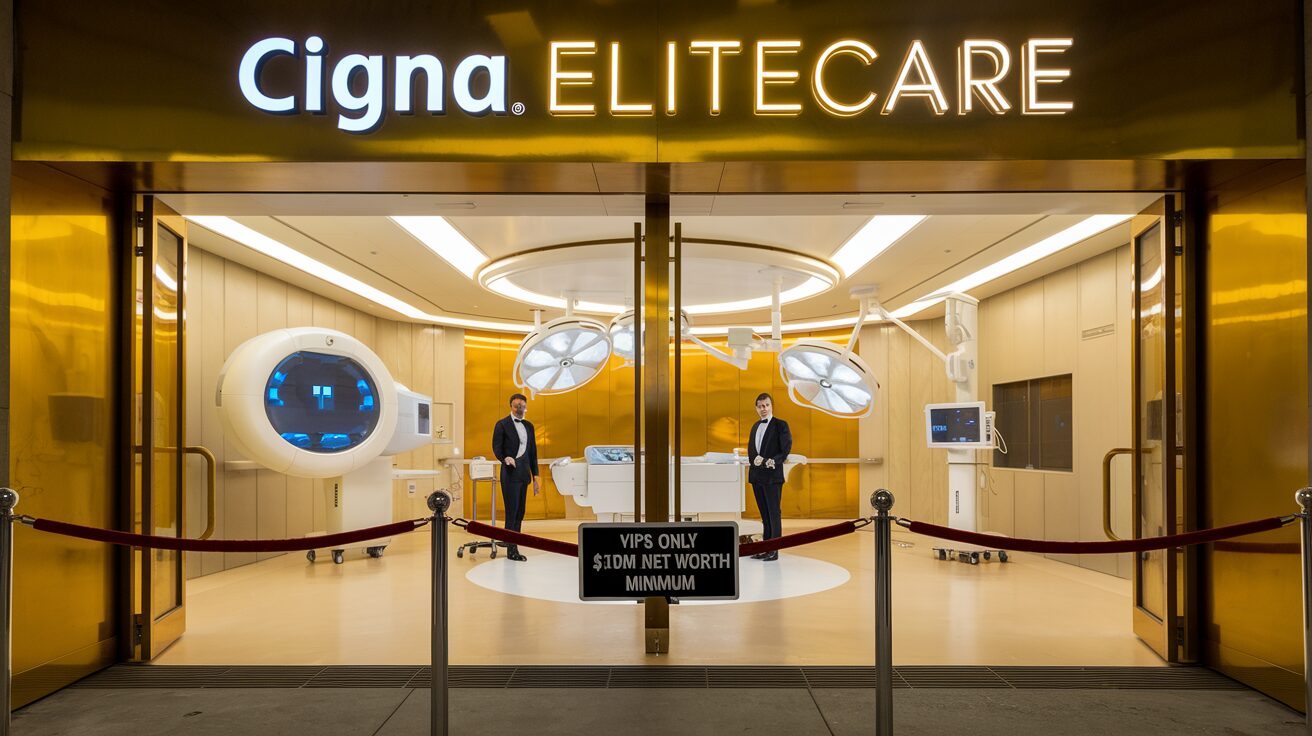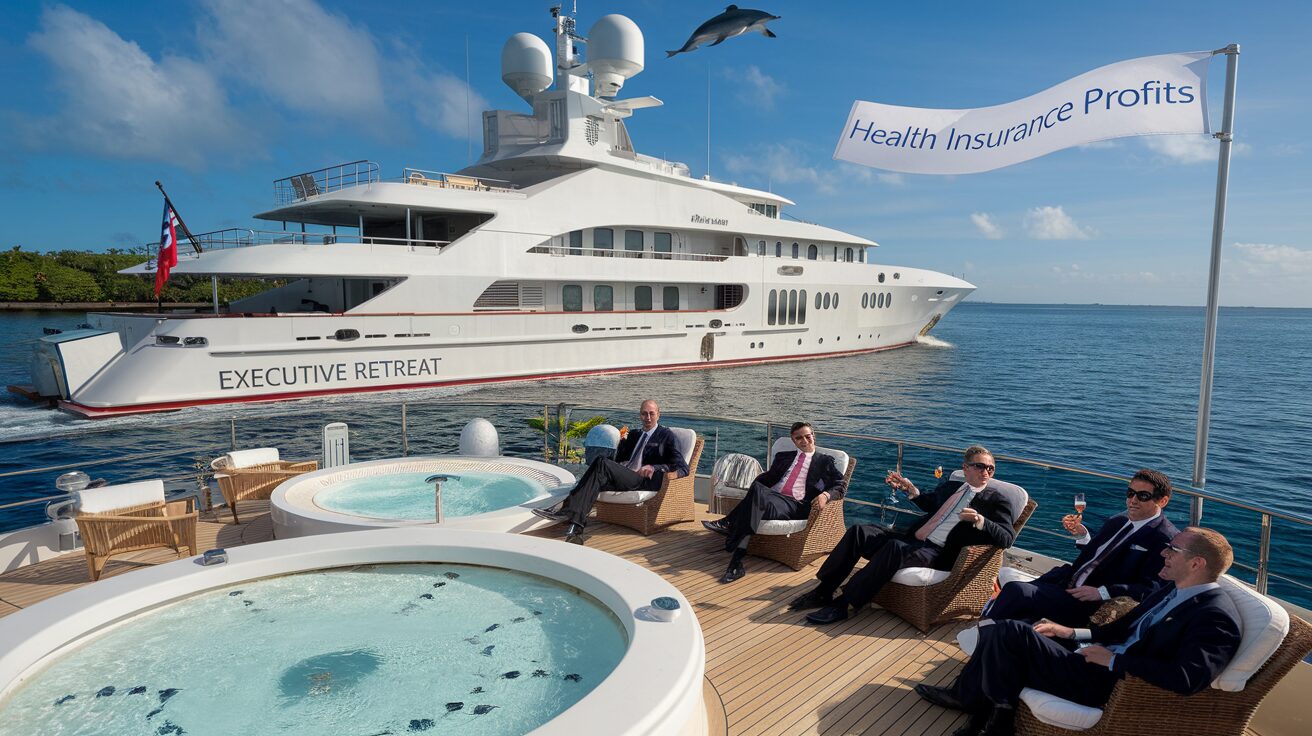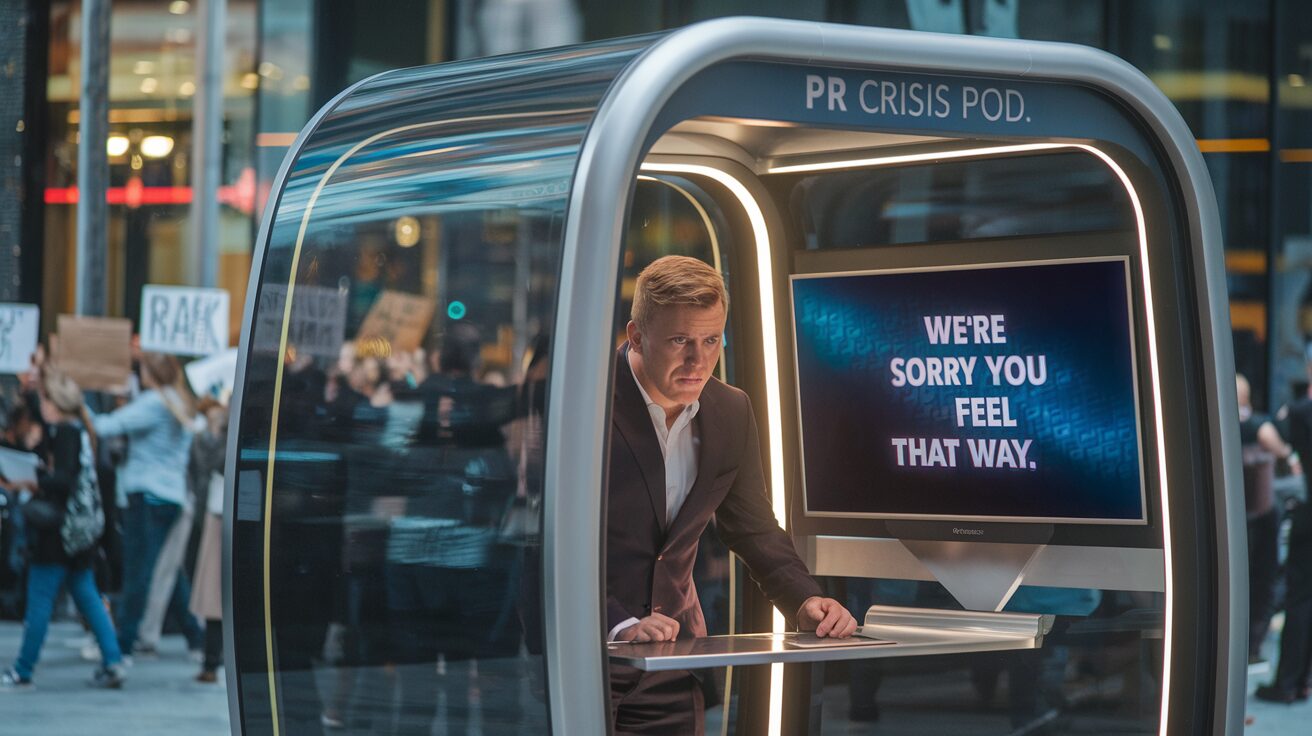New York, NY — America’s healthcare executives have emerged from their gilded fortresses to announce sweeping reforms. No, not for patients—don’t be ridiculous—but for their own safety. After the tragic murder of UnitedHealthcare CEO Brian Thompson, the healthcare industry is taking bold steps to ensure that no executive will ever again face the terrifying consequences of profiting off other people’s misery.
At a press conference held in an undisclosed vault, UnitedHealthcare’s interim CEO sought to reassure its shareholders.
“We take these events very seriously. That’s why we’re investing millions in bulletproof boardroom furniture, biometric panic rooms, and—our proudest achievement yet—a cutting-edge AI program to reject claims before you even finish describing your symptoms. Progress is a beautiful thing.”
Titanium Desks, Panic Rooms, and the Magic of AI
In an industry-defining move, UnitedHealthcare unveiled plans for DENY-3000, the revolutionary AI that rejects claims with a speed and cruelty no human could ever match.
“Patients used to wait weeks to find out they weren’t covered,” said the VP of Efficiency Haldon Hirk. “Now, DENY-3000 will alert you in real time that your life-saving treatment is considered ‘cosmetic’—even if it’s chemotherapy. Efficiency is king, and nothing says innovation like telling a patient to try yoga instead of surgery.”
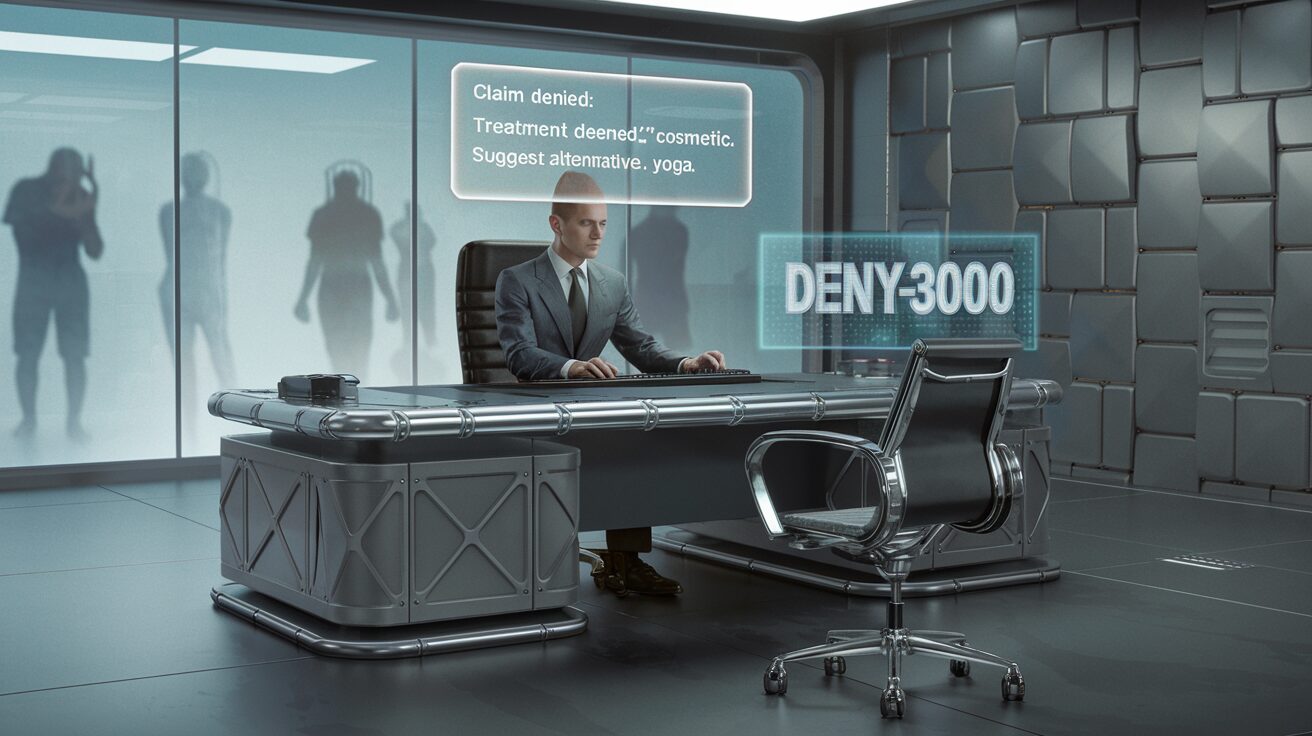
Not to be outdone, BlueCross unveiled their “Safe Spaces for CEOs” initiative, promising to outfit every C-suite office with titanium-reinforced desks, blast-proof swivel chairs, and “empathy-resistant” soundproof walls to block out any cries of suffering from nearby customers or employees. A spokesperson noted that these upgrades will help executives focus on what they do best: “maximizing profits while minimizing eye contact with human suffering.”
And the innovation doesn’t stop there.
New Initiatives to Keep Executives Safe and Cozy
- Escape Hatches in Boardrooms
 In a bold push for ultimate security, Anthem announced plans to install underground escape hatches beneath every boardroom. “In the event of an employee uprising, stockholder disappointment, or a pesky journalist with questions about ethics, executives can simply pull a lever and slide down a golden tube to an undisclosed location,” explained the company’s Chief Safety Strategist. Early testing has reportedly been so successful that one executive has been “hiding out” for weeks just for fun.
In a bold push for ultimate security, Anthem announced plans to install underground escape hatches beneath every boardroom. “In the event of an employee uprising, stockholder disappointment, or a pesky journalist with questions about ethics, executives can simply pull a lever and slide down a golden tube to an undisclosed location,” explained the company’s Chief Safety Strategist. Early testing has reportedly been so successful that one executive has been “hiding out” for weeks just for fun.
Executive-Only Healthcare Plans
Cigna unveiled its newest perk for top executives: Cigna EliteCare, an exclusive healthcare plan that guarantees same-day organ transplants, unlimited access to experimental treatments, and a personal team of surgeons on retainer—all covered at 100%. The plan explicitly prohibits anyone earning less than $10 million a year from enrolling, ensuring what one insider called “a true VIP experience.” A leaked memo revealed the tagline for the rollout: “Because our executives are worth it, and you’re probably not.”
Therapeutic Yacht Meetings
To combat the “emotional strain” of running an industry that denies wheelchairs to veterans, several companies have pledged to hold all executive meetings on fully staffed mega-yachts. These yachts, outfitted with jacuzzis, champagne fountains, and personal dolphin trainers, will serve as floating havens of calm. “When the public criticizes us for decisions that affect their lives,” said one exec, “it’s important to decompress somewhere far from the noise. Preferably in international waters.”
The Denial Vault
To symbolize their commitment to claim rejection, a coalition of healthcare giants is constructing a physical “Denial Vault.” This sprawling underground complex, modeled after Fort Knox, will store printed copies of every claim they’ve ever rejected. “It’s a monument to our legacy,” said the architect. “Plus, if an angry mob ever storms headquarters, we’ll just hide in it.”
On-Call PR Crisis Teams
Recognizing the frequency of public backlash, Humana has invested in 24/7 PR crisis pods. These high-tech capsules will be strategically placed in every major city, allowing executives to record teary-eyed apology videos within minutes of negative press. The pods come with preloaded scripts, including such classics as, “We’re sorry you feel that way,” and, “This isn’t who we are (except it is).”
Healing America, One Executive at a Time
The reforms don’t stop at physical safety. UnitedHealthcare and its peers also pledged to support the mental health of their executives with luxurious new wellness programs. These include all-expenses-paid spa retreats in Switzerland, gold-leaf aromatherapy candles, and weekly sessions with life coaches trained in the delicate art of helping billionaires cope with public criticism. One wellness consultant praised the initiative as “revolutionary self-care for those brave enough to make the difficult choices—like denying a NICU stay for a preemie baby because it exceeded the deductible.”

For frontline workers—those brave souls answering phones as enraged patients cry about their denied care—the wellness package includes one free stress ball shaped like a middle finger.
A leaked memo also revealed plans for a new “Employee Wellness Webinar Series,” featuring topics like “How to Smile While Saying ‘No'” and “Meditative Breathing Techniques for Ignoring Your Conscience.” Attendees will receive a coupon for 10% off their next denied claim appeal.
A Bold PR Campaign: “We Care (But Only a Little)”
Recognizing that their image could use a little spit and polish, healthcare execs are rolling out a new ad campaign: “Healing America: But First, Let’s Talk Deductibles.” The campaign promises to showcase smiling patients (actors, naturally) alongside heartfelt messages like, “We’d love to help… but we won’t.”

In the meantime, corporate heads are reportedly working on a series of humanizing initiatives, including inviting journalists to tour their private jets and offering behind-the-scenes looks at how they spend their bonuses. “We want people to see the human side of us,” one executive explained. “Like when I had to wait a whole week for my yacht’s custom upholstery. I understand struggle.”
Thoughts, Prayers, and Mildly Threatening Memes
Reaction to these initiatives has been mixed. Patients struggling with medical debt took to social media to express their feelings. One viral post read: “I sold my house to pay for chemo, but I’m so glad Jeff the CEO has a bomb shelter under his office. Thoughts and prayers, bro.” Another commenter quipped, “At least DENY-3000 is faster than their customer service hotline. Progress!”
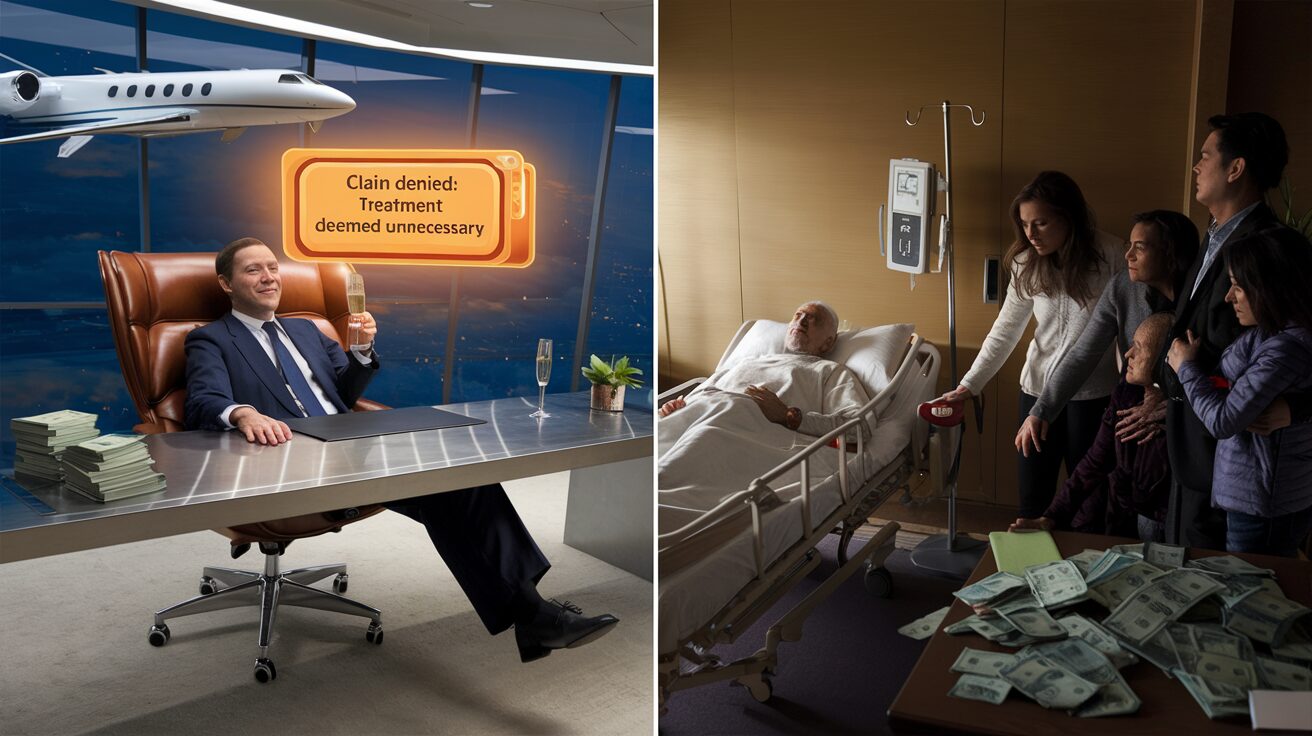
Executives, however, dismissed such commentary as “uninformed.” One anonymous source scoffed, “These people need to understand: we’re doing everything we can to make their experience seamless. By ‘seamless,’ I mean they’ll seamlessly transition from being denied coverage to being harassed by debt collectors. That’s efficiency!”
Not everyone is leaning into the snark. Hurdle Centrum, a self-described centrist with a heart of gold and a mind of steel, offered this thoughtful take in a widely shared Facebook post.
“To all those who are celebrating this tragedy, it’s important for you to gain some perspective. Yes, thousands die every year because they can’t afford healthcare. Yes, medical debt ruins lives. But excusing or even joking about violence against CEOs puts us on a slippery slope. Next thing you know, someone will torch a yacht, and then where does it stop? Somewhere out there, someone thinks you are the problem, too. Be better, alright. It is what it is.”
Meanwhile, an insurance industry insider had their own perspective on the public’s outrage.
“Listen, no one wants to deny someone their dialysis, but let’s not forget the important work we’re doing here. Private jets don’t fuel themselves, and executives need safe spaces to innovate. Can we just focus on the positives for once?”
For now, the public remains split between those laughing through their tears, those shaking their fists in righteous fury, and those like John, bravely standing up for the embattled CEOs of America. In the healthcare industry, profits—and panic rooms—will always take precedence.


